A story of mothers in Bajura who gave birth to 15 children but could not save half of them.
-Prakash Singh: Centre for Investigative Journalism-Nepal
Bishna Kala Thapa, 41, of Himali village municipality -1, Bajura has apparently a womb of steel. This June, she gave birth to her 16th baby at the district health post. However, she gave birth to other 15 children in her house without the assistance of health care providers.
Among 16 children, only seven are alive now. How could anyone speculate that her biggest achievement – after her marriage at a tender age of 14 – she has been giving birth to 16 children? Ask her how she managed to endure such pain. She has no answer. Her husband Jaidhan Thapa, however, has a modest answer: “We had no idea…no contraceptive facilities.” Sighs!
Dr. Tika Ram Rai, medical officer at Bajura emergency pregnancy center says, “Bishna Kala has become anemic along with some other complications.” In fact, Bishna Kala’s family is undergoing disaster. Farmer Jaidhan, whose yield does not even suffices three months, is panicked and troubled. A question that regularly pops up in his mind is about raising his children and saving his wife.
He works as a laborer at Kolti bazaar while at times he sells medicinal herbs to make a living. His eldest child is an eighth grader. Asked about educating his children, he quips, “Forget about studies, the concern is about survival.”
Arma Buda of Swamikartik village municipality was almost dead while giving birth to her 16th baby six months ago at a primary health center in Kolti. Married at the age of 15, Arma’s life is not too different from Bishna Kala. Her seven out of 15 babies were stillborn. According to Arma’s husband, Payan Buda, only the 16th baby was born in a health post. If so, were all the 15 children born at home? The answer is ‘no’. “Some were born in the fields, some in the jungle, and some…” he recalls.
These heartrending stories of Bishna and Arma are merely symbolic ones that represent the far-western hilly district of Bajura. Majority of the couples of the district neither have idea about contraceptives and family planning techniques nor do they have plans or knowledge about the appropriate age for conceiving a baby.
Shristi Regmi, Deputy Mayor of Budinanda municipality says, “This practice is not unusual here. This is common in the villages of Bajura.”
A mother of 14 children, 42-year-old Kalsari Buda of Himali village municipality candidly expresses her woes, “There were no health posts to undergo pregnancy test. We gave birth anywhere felt comfortable.” Women of this district are still facing hardship due to lack of modern facilities like transportation, communication and knowledge. Kalsari is only a representative character, who has undergone numerous sufferings while giving birth to a baby in the village. Despite leading a miserable life with insufficient food and clothing, Kalsari sent her children to school but the adverse situation in her family compelled her to send children to collect medicinal herbs or to work as laborers in Kolti and Martadi bazaar. She says, “Don’t know why, I started experiencing pain in my uterus after I gave birth to my fifth child. What else can I do than to endure the pain?”
The story is similar to 62-year-old Muga Giri of Budinanda-2. She gave birth to 18 children, including twins. Now a mother of nine living children, Muga says, “People take it a burden to raise one or two children. Imagine how we raised our children by feeding sisnu (a plant that gives burning sensation when touched).” Hard to believe, but says she never ate at her fullest while raising her children. Now, she complains of back pain at sometimes and problem in her uterus. “Perhaps, God saved us,” she grins.
Uterus prolapsed problem
Due to unsafe delivery, lack of rest and giving birth to many children create problem in the uterus for many women in the village. Many women have been facing uterus prolapsed problem, which they have been hiding with the fear of family and society.
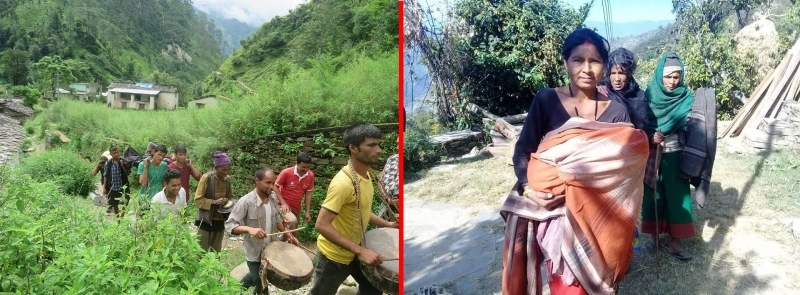
Villagers of Budinanda municipality rejoicing the birth of baby boy while no reaction on birth of a baby girl of Yasoda Thapa in Chededaha municipality-2
Another Namakala Buda of Swamikartik municipality-3 also gave birth to 13 babies. She got problem in her uterus after she gave birth to her fifth child. Like other women, she also gave birth to her children at home; some were at jungle and or in the working fields. She said, she has not seen any doctor yet, and the only reason is poverty.
Nankala Kathayat of Swamikartik-5, who gave birth to 14 children, shares the same story of pain in the uterus. She narrates a horrific story of how she is going through the uterus prolapsed problem while giving birth to a baby.
For Laxmi Pandit, 73 of Badimalika-3, it’s been 10 years she is suffering from uterus prolapsed. She felt ashamed to share the problem to her husband and other relatives. The problem first occurred while giving birth to her third child. Only after a decade of her problem, she got chance to share it with health workers at the district health office in Bajura. Luckily, she managed to grab the opportunity of free health camp to get her problem operated and relieved.
Another 35-year-old Jalu Saud of Badimalika-8 has been suffering from the same problem since the last 21 years. She had been suffering from uterus prolapsed problem soon after she gave birth to her first baby at the age of 14. She gave birth to three other children despite being aware of the problem.
Badimalika municipality’s 50-year-old Fugi Dani, who underwent successful operation, shares the same story. Senior health assistant at the district health office in Bajura, Tek Bahadur Khadka says, “Marriage in a tender age, giving birth to too many babies, carrying heavy load during and after pregnancy are some of the main causes of uterus prolapsed.”
According to senior health worker Sharmila Shahi, lack of education is one of the reasons for this problem. She described the situation as “horrible”. Usually, 20-35 years is considered ideal to give birth to a child. However, a 20-year-old woman in western remote villages does have two to three children. Giving birth to babies continue until 45 years of age, which is unsafe to both mother and child.
Consider what Dr. Rup Chandra Biswokarma, Chief of District Health Office has to say: “The root cause of the problem is early marriage, and maternity in a tender age or old age.”
Weak and crooked
Another common problem among the women is anemia. A 35-year-old woman of Budinanda municipality-8 gave birth to 11 babies and has been living with anemia. Doma Gurung has only three survivals now.
Dr. Biswokarma says, “Insufficient intake of green leaves, vegetables and iron-based food causes anemia.” Bisnakala Thapa, who took the help of health worker to give birth to her 16th baby, had to be given two pints of blood due to anemia. Many other mothers are now suffering from back pain as well. These mothers look aged in early forties, and even can’t walk straight. Mufa Giri, who gave birth to 18 children, can’t walk straight due to severe back pain. Kalchu Nepali, 55, of Budiganga-9 too faced the same problem while giving birth to her 11th child.
Culture and poverty
Janajati women representing Bhote community of the northern belt of Bajura district basically have this problem and seem to be getting worse because of unhygienic and unsafe pregnancy. Hard work and lack of rest during pregnancy and after delivery are other reasons for getting weak and anemic.
‘Four of my babies were stillborn’
Pampha Rokaya, 42, Budinanda municipality-3 Nuri
 How many babies did you give birth to?
How many babies did you give birth to?
I gave birth to 13 babies’ altogether. Four were stillborn. A four-year-old daughter and a two-year-old son died. I have now seven survivals and the youngest son is three years old.
Wasn’t it (giving birth to so many babies) traumatic?
Of course, it was. There was no enough food to eat during pregnancy and after delivery. Due to insufficient intake of proper diet, four of my babies were stillborn. My delivery was not in the health post neither at home, all my babies except younger one born in the forest or in the field.
I am running in a hotel now, leaving all my children at home. With this work, I can at least provide food and clothes to my children.
Isn’t it a herculean task to raise so many children?
Indeed, problems were numerous from food to clothing. My carpenter husband brings some money with which we have been managing our expenditure.
“Eight are alive, nine died”
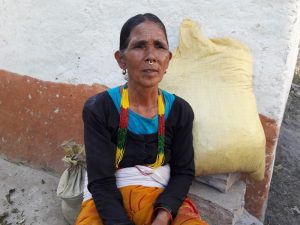 Muga Giri (50), Budinanda Municipality-2 Kolti
Muga Giri (50), Budinanda Municipality-2 Kolti
How many babies did you give birth to?
I gave birth to 17 children out of which only eight are alive. One among the twin daughters is also alive.
Wasn’t it a heroic task to raise so many children?
We faced numerous problems. The births of my babies were not in the health care centers as we did not have health posts around. As a result, I am enduring numerous problems like back-pain and uterus pain. I even suffered from prolapsed uterus while giving birth to a baby. A woman, who took care of me, put it inside. Since then, I have been suffering from abdominal and back pain. In fact, how can a baby come out easily? Lack of cautiousness will lead to a prolapsed uterus. We experienced excessive bleeding and weakness.
How did you take care of such a big family?
We worked hard, carried manure for others by carrying our children. Thrashed paddy and went to fetch grass for cows and collect firewood by leaving our children alone at home. Being illiterate, we had no option than to toil to sustain our lives. Seems my work was to give birth to babies.
Wasn’t it a pain to give birth to so many babies?
Of course, it was painful and excruciating. Might be because of that, I am unable to stand or sit properly. My entire body, including hip, aches. You can’t imagine that sometimes I keep awake the whole night due to pain.
“Assuming that she was dead, we threw her in the bush. But she was alive”
Bishna Gurung (52) Budinanda Municipality-7
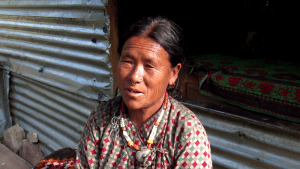 How many babies did you give birth to?
How many babies did you give birth to?
Altogether fifteen. Eight are still alive, seven died.
Wasn’t it a pain to give birth to so many babies?
Why not? Temporary migration made it even worse. We are, in fact, squatters without house and land on our own. Sometimes, I gave birth to a baby while walking. Nutritious food was a mere fantasy. Oh, how can I forget the moment when endured excessive bleeding? Sometimes, I even had to walk soon after giving birth to a baby.
Didn’t it affect your health?
Why not? I had never seen a health post for delivery. Regular check-up was beyond imagination then. Because of the freezing cold, some babies died soon after birth. Except for the first one (son), six others died soon after the birth. Later, my husband died. What could I do besides enduring the trauma? We have neither money nor nutritious food to eat. This year, I bled so heavily that I had to visit the doctor. And you know what; I spent 10 thousand rupees for treatment. Last year, I spent 20 thousand rupees for the same problem.
You might have undergone numerous problems in raising so many kids.
Absolutely, problems are still there in my life. A child needs 50 rupees per day. Now imagine how much I have to spend for all of my children. Problems are numerous besides we are getting older day by day. I have 50 sheep and I am farming them for a livelihood.
You gave birth to so many babies. Do you have any reminisces about any major incident?
I gave birth to a daughter while coming down from the hill. Assuming that she was dead, I threw her in the bush nearby. Three hours later, my sister-in-law heard her crying and brought her home. It was snowing. My sister-in-law furiously scolded me for throwing away the baby. Now she is an 8th grader.
Does that mean all your children were born on the way (path)?
No, no! Some were born at home, some on the way and some in the jungle. Two of them were born in Achham, one while on the way to Bhot, one in Marku, two were born on the way to Achham.
“They get sick and die of freezing cold, can’t save”
Doma Gurung, 35, of Pandusen
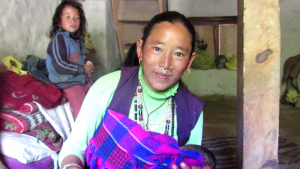 How many children did you give birth to?
How many children did you give birth to?
I gave birth to 11 children.
Wasn’t it a pain?
Definitely, since it was freezing cold under the tent. Some babies were born on the way. We had neither sufficient food to eat/ nor warm clothes to put on. Never got a chance to rest due to which I am suffering from excessive bleeding.
Didn’t you ever think of using contraceptives?
No. Sometimes we go to Bhot and sometimes to Achham to sell sheep. We had no idea about family planning.
Where did you give birth to 11 babies?
Two at home and others while on the way to work. Some died under the tent due to freezing cold. Protecting a child from extreme cold is, in fact, a tough job.
Didn’t giving birth to so many babies affect your health?
Why not? Lots of problems, including stomach and back-ache, excessive bleeding, fever, weakness etc. I lost my eight children, only three – a son and two daughters – are alive. The youngest one, who is now 20 days old, was born at home. I have only heard about health posts but have not been there.
What problems did you face while giving birth on the way?
Cold is the major problem besides lack of food and warm clothes. We are compelled to walk soon after giving birth that causes excessive bleeding and uterine prolapse. Weakness is another factor.
“Go to hospital for lower abdomen pains, they say ‘no medicine”
Bishna Thapa (60) Pandusen-5
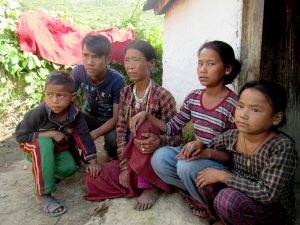 How many babies did you give birth to?
How many babies did you give birth to?
I gave birth to 15 babies, among them only five are alive.
How did you give birth to so many babies?
Sometimes I gave birth on the way to Achham and sometimes on the way to Bhot. I even gave birth in the jungle. Parent-in-laws will not tolerate us sitting idle. There is neither hospital nor money with us for the proper treatment.
What problems did you face while giving birth to 15 babies?
What should I talk about problems? Go to the jungle, feed the cattle, and work continuously without nutritious food like milk, yogurt, butter, etc. Some children died to freeze cold while some were stillborn.
Did you send your children to school?
Only my boys going to school. The elder son, who studied till 12th grade, has joined the police forces, another son is an 8th grader and the rest two are in grade 7 and 3 respectively. But for daughters, it is like a dream to study because I could not afford them to send to school.
What health problems you faced while giving birth?
I experience severe chest pain, backache, abdomen pain, and so many problems like excessive bleeding. Hospital says they have no medicines for free as we could not afford them.
‘Some died; while others survived”
Kusha Chadara (60) Kolti-3 Siradi
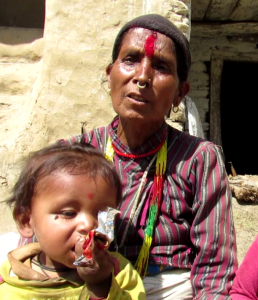 How many children did you have?
How many children did you have?
I gave birth to 12 babies. Only six are survived.
What problems did you face during delivery?
I faced numerous problems, including food and clothing. I was forced to spend several weeks in a cow-shed and as a result, I became sick due to freezing cold. There were no health posts during those days. Therefore, we depended on local herbs. I worked as a laborer to raise my children. It was, in fact, challenging to raise those children who survived.
Haven’t you sent your children to school?
One studies in grade 12, the other one in grade 11 and the third one in grade 10. In fact, educating children is another herculean task for poor and unfortunate people like us. Since I cannot afford to buy stationeries for them, they earn themselves by working as potters.
“Out of 11, 7 died, four survived”
Pantu Chadara (60) Kolti-3
 How many babies did you give birth to?
How many babies did you give birth to?
I gave birth to eleven children.
What problems did you face while giving birth to so many babies?
Oh, don’t talk about problems. Imagine our fate when we had nothing to eat, no clothes to put on and at the same time when I had excessive bleeding. I had a severe headache besides excessive bleeding and weakness. Moreover, I had to stay inside the shed for a month or so. Since my husband was not at home, I had to cook myself.
In that case, why did you give birth to so many children?
We neither had contraceptives nor hospitals during that time. It’s all about time and situation.
What major problems did you undergo while raising your children?
We ate whatever we could get, including green leaves. Out of 11 live birth, seven died after few days or a year. We have not enough land to cultivate, so forced to work as laborers. One of my sons, who has gone to Mumbai, earns a little.
Nrip Thapa (Bhote), Chairman of Federation of Bhote Janajati says, “Most of the Bhote women are compelled to give birth to babies on the way while migrating to warmer areas (for six months) to protect from cold basically due to poverty.”
Majority of people in the mid and far western hilly districts like Bajura, Bajhang, Mugu, Humla, and Jumla have the practice of seasonal migration to warmer areas during winter season when many women give birth to babies on the way or even in the fields. These women neither see health posts during pregnancy nor do they administer vaccines to them and their children. That creates problem to both mother and babies and such stories are hard to come out in the public.
Janajatis representing the Bhote community basically reside in the northern belt of Bajura district. Seasonal migration, geographical remoteness, and lack of awareness have been the major reasons for their ignorance about health posts and facilities. Moreover, health posts in these districts are neither equipped nor effective. Dipak Shah, senior health assistant of district health office says, “Problems could be numerous, but the major problem is poverty.”



